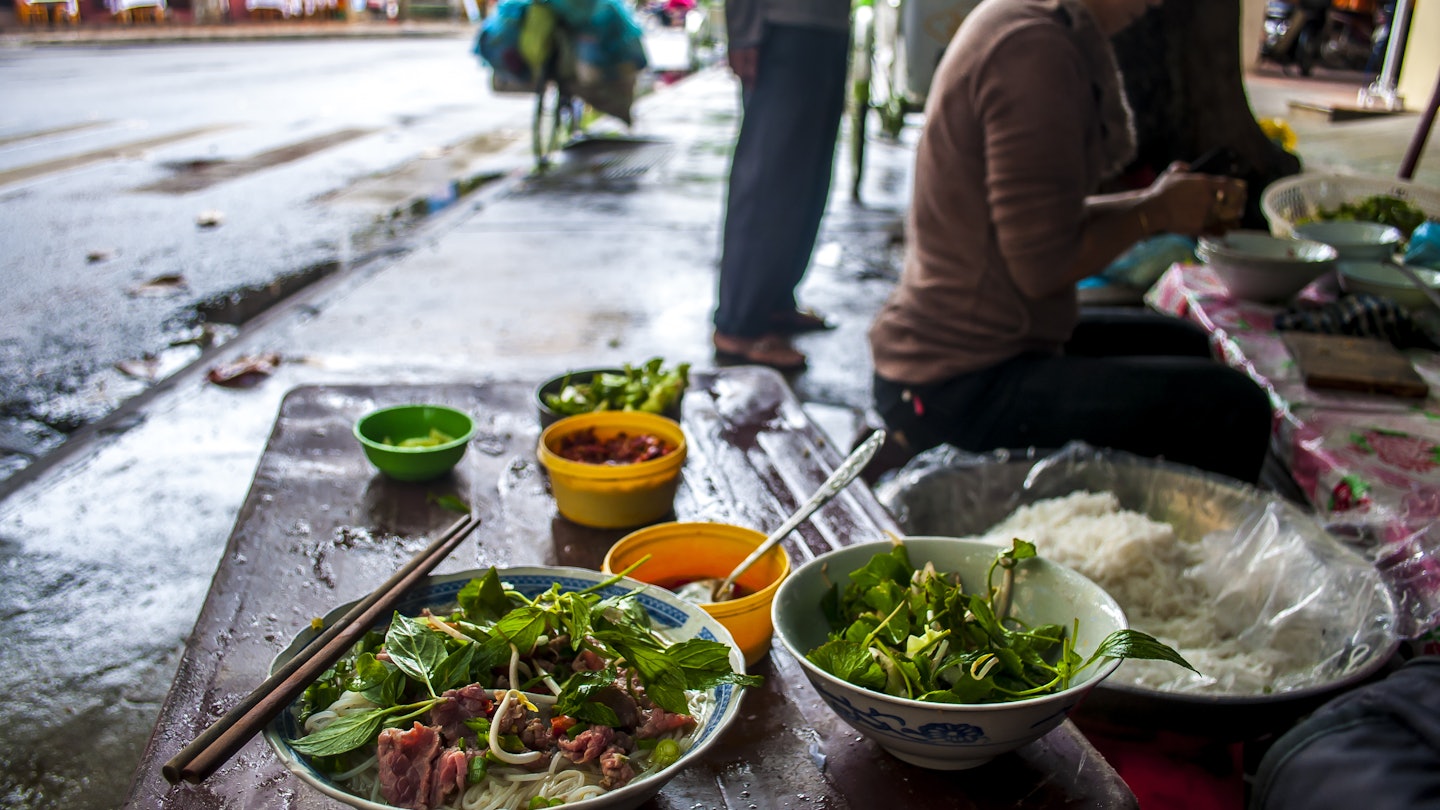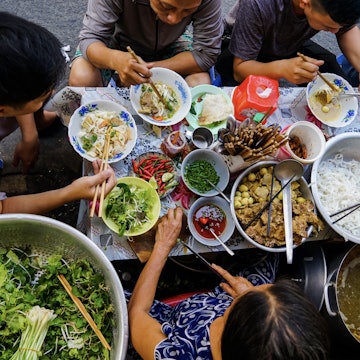

Hanoi street food. JNEZAM/Shutterstock
Living in Hanoi for so long has given me plenty of reasons to both love it and grumble about it, but whenever I’m away, it’s the sidewalk food I find myself longing for most.
Hanoi's street food isn't just about what you eat – it's about how you eat it. It's the creative, chaotic pulse of the city's social life. You see the influences everywhere, from the French baguettes that became our signature banh mi, to the Chinese stir-frying that we made our own. We took the best from both worlds and blended them into something completely unique. Each dish is a story of perfect balance: a little sweet, a little sour, salty and spicy all at once. To really get it, you have to forget everything you think you know about dining. Just pull up a tiny plastic stool on the sidewalk, right in the middle of all the noise and traffic, and dig in.
1. Pho bo (beef noodle soup)
Let’s start with the most popular, beef pho, or pho bo – a classic Vietnamese noodle soup you won't want to miss when you are here. A good bowl always has three things: springy rice noodles, tender beef slices (rare or well-done) and a broth that speaks of hours of simmering beef or pork bones, onions and spices like ginger, star anise, cinnamon and black cardamom. For me, what sets it apart is that delicate sweetness that only comes from time and patience. A squeeze of lime or a splash of chili sauce changes the mood of the whole bowl.
Locals often queue at Pho Gia Truyen Bat Dan or Pho Suong for the traditional version, while Pho Thin offers a bolder style with stir-fried beef. If you're craving a tasty bowl of pho bo at midnight, Pho Bo Ly Beo is a great choice.

2. Pho ga (chicken noodle soup)
Thinking a bowl of pho ga is just pho bo with chicken instead of beef is a common mistake. I'd say it's something entirely different. The broth itself is much lighter, almost delicate. It’s slow-simmered with chicken bones, roasted onion and ginger, and a subtle blend of spices. When the noodles and chicken hit the bowl, a sprinkle of thinly sliced lime leaves is added on top, giving the whole dish this incredibly unique, refreshing aroma you won't find anywhere else.
My two favorite places for pho ga are Pho Ga Nguyet and Pho Ga Cham, both known for their rich broth and freshly thick-cut chicken. If you're in the Truc Bach area, Pho Ga Tien is a local favorite with an authentic taste. For something different, the soupless version (pho ga tron) at Pho Hanh is a must-try.
3. Bun cha (grilled pork with noodles)
Bun cha is a popular Hanoi-born dish so iconic that it brought a US president and a celebrity chef together on plastic stools. Often enjoyed as a lunch, bun cha consists of smoky, char-grilled pork patties and slices of pork belly served in a bowl of steamy, warm, sweetened fish sauce with pickled papaya. You pair the meat with a generous portion of white rice noodles and a heap of fresh herbs like perilla, lettuce and mint. The combination is a unique mix of textures and flavors – crispy, soft, savory and herbally fresh.
The world discovered Bun Cha Huong Lien when President Obama and Anthony Bourdain ate there in 2016, but I still prefer small family-run shops tucked into Old Quarter alleys. One of my favorites is Bun Cha Tuyet, where their special cha xuong song, the grilled pork patties wrapped in xuong song leaves, have a deliciously earthy aroma you won’t forget.

4. Banh cuon (steamed rice rolls)
Banh cuon is one of my favorite breakfast dishes, a nostalgic reminder of childhood mornings and the village market. This dish features delicate, translucent rice paper sheets that are steamed and filled with a savory mixture of minced pork and wood ear mushrooms. Topped with crispy fried shallots, these rolls are normally served with a light, fish-sauce-based dipping sauce, together with cha que (cinnamon pork sausage), cha com (pork patty coated with green rice flakes) or lap xuong (Chinese sweet and fatty sausage). If you get the chance to sit where you can watch the banh cuon being made (a ladle of rice flour batter is poured over a piece of taut fabric over a steamer), you'll understand why it's a dish that requires true culinary skill.
Head to Tue An - Banh Cuon Nong & Pho Bo or Banh Cuon Ba Xuan, where you can watch the talented cooks steam the rolls right in front of you, for a classic version. If you prefer more variety, Banh Cuon Gia Truyen Thanh Van offers fillings like chicken and shrimp, and you can even ask for an egg-filled roll. For something different, I recommend Banh Cuon Ong Toi because I enjoy the grilled pork served in its dipping sauce. A unique twist on this dish is Banh Cuon Phu Ly. Unlike the traditional hot version, these soft, chewy and pure white rice rolls are served with smoky, charcoal-grilled pork patties.
5. Cha ca (turmeric fish with dill)
Not trying cha ca while in Hanoi is a huge missed opportunity, as this iconic dish can rarely be found anywhere else in the country. It's so famous, in fact, that an entire street is named after it.
The real fun of cha ca is that it’s a do-it-yourself experience right at your table. A sizzling skillet arrives with turmeric-marinated catfish, dill and spring onions. You cook it all yourself, then scoop it onto a bed of rice vermicelli. Just add some crunchy roasted peanuts and a spoonful of the fermented shrimp paste sauce (mam tom), and you’ve got a mix of textures and aromas that perfectly defines Hanoian cuisine.
You can find cha ca all over Hanoi, but to taste the version most tied to legend, visit Cha Ca La Vong on the street that now bears its name. Locals say the Doan family first served the dish there back in the late 19th century, and ever since, generations have kept the tradition alive. For a more comfortable dining experience and a potentially better price and quality, consider these great alternatives: Cha Ca Thang Long and Vua Cha Ca.

6. Bun oc (snail noodle soup)
Don't let the name deter you. Bun oc is a beloved dish for a reason: it’s all about the harmony of flavors and textures. The broth is a complex brew of pork bones, tomatoes and fermented rice vinegar (dam bong), giving it a light, tangy character. The river snails are small and chewy, adding a unique texture to the dish, which also includes fried tofu and a handful of green herbs. I personally like a topping of thinly sliced beef in the bowl. Make sure you add chilli oil in the soup to make the best flavor of the dish. Hanoians often eat bun oc in the first days of the lunar new year as a way to "reset" their palates after the heavy holiday feasts.
While you can now find bun oc at chain restaurants, some of the best bowls are still served at small, decades-old shops hidden in the Old Quarter's tiny alleys. For a traditional taste, I recommend Bun Oc Co Them on lively P Hang Chai, a spot that's been around for over 20 years. Another great choice is the small Bun Oc Co Hue on P Nguyen Sieu. If you enjoy the bustling atmosphere of a local market, Bun Oc Thuy on Ng Dong Xuan is a popular spot with locals.
7. Bun rieu cua (crab noodle soup)
Every summer when I was young, my mother would prepare bun rieu cua from freshwater crabs she caught in the fields. The broth, tangy and rich, is layered with flavors of tomatoes, fermented rice vinegar, crab paste and fermented shrimp paste. Served with fried tofu and water spinach, it’s a dish that tastes like home to me – comforting and fresh at the same time.
For a delicious bowl of bun rieu cua, my favorite spots are Bun Rieu Co Hoan and Bun Rieu Hang Bac. Just grab one of the tiny plastic stools on the sidewalk and enjoy a steaming bowl packed with flavor.
8. Banh mi (Vietnamese baguette)
Head down any street in Vietnam, and you’re sure to run into a banh mi stall. They're literally everywhere, from the busiest highways to the most hidden back alleys. I personally love the versions from central and southern Vietnam for their big, bold and spicy flavors. But Hanoi's banh mi is still incredible, offering a milder taste with so many different fillings to choose from.
The French might have introduced the baguette, but we perfected it. We took that simple bread and turned it into a culinary phenomenon, stuffing it with everything from a classic omelet with pate to smoky grilled pork or rich, slow-cooked beef. For Hanoians, banh mi is a staple of daily life – something to grab in the morning on the way to work, or as a quick, satisfying meal at any time of day.
It’s hard to name the single best banh mì in Hanoi, but a few places really stand out. Banh Mi Pho Co 38 Dinh Liet and the long-loved Banh Mi Ba Dan have been serving up tasty grilled pork and pate sandwiches for over 40 years, making them favorites with locals. For something richer, the pan-seared beef with cheese at Banh Mi 25 is a must-try, while Banh Mi Tram is famous for its hearty beef stew in red wine (sot vang).

9. Bun ca (fish noodle soup)
You might wonder: “Why are there so many dishes called ‘bun’ in Vietnamese cuisine? Are they really that different?” The answer is yes – each one has its own distinctive flavor. Take bun ca (fish noodle soup), for example. My favorite spot in Hanoi is Bun Ca Sam Cay Si, a modest eatery tucked beside a mysterious shrine under an ancient banyan tree. The broth here is light and clear, simmered from fish bones and brightened with pineapple and tomatoes. Every bowl comes loaded with crispy fried fish and fresh seasonal vegetables, and the shop is especially famous for its fish rolls, made with a recipe handed down from Hue.
Another hidden gem is Bun Ca Thai Binh, where locals patiently queue for their fix. Unlike most places, which serve fried fish, the fish here is boiled, deboned then braised with turmeric and fish sauce before being simmered for three hours. The result is firm, sweet and deeply flavorful meat, served with vegetables like water spinach and water celery, plus a tangy kick from sour bamboo shoots.

10. Pho cuon (rolled pho)
Is it a spring roll? It may look like one, but pho cuon is a dish of its own. I’ve been eating it in the Ngu Xa area – where it first appeared by chance – since my college days, when it was the perfect cheap, quick and filling meal. Tender stir-fried beef with crisp lettuce and fragrant herbs is wrapped in a fresh, chewy sheet of pho noodles. Funny enough, this beloved dish began as an improvised solution by a pho stall owner who had simply run out of broth. I used to eat at Pho Cuon 31 for its wide menu, but these days I find myself preferring Pho Cuon Chinh Thang. That said, Pho Cuon Huong Mai (a chain restaurant) and Pho Cuon Hung Ben are both excellent choices too. And wherever you go, don’t miss pho chien phong (crispy deep-fried pho) – a signature specialty at most pho cuon spots.
11. Bun dau mam tom (fried tofu with fermented shrimp paste)
Most foreigners aren't fans of the strong taste of mam tom (fermented shrimp paste). I didn’t like it much as a child, especially by itself. But many Hanoi’s dishes aren't complete without it, including cha ca, bun thang (thang-style chicken noodle soup), and, of course, bun dau mam tom.
The name of the dish tells you exactly what it is: rice vermicelli and crispy fried tofu dipped in fermented shrimp paste sauce. To get the best flavor, you have to squeeze a few kumquats into the sauce and stir it until a light purple foam appears like magic. I remember in the old days, the dish was just fried tofu and bun tuoi (fresh rice vermicelli), but now it comes with a variety of delicious additions, like pork patties coated in green rice flakes (cha com), fried spring rolls (nem ran), boiled pork leg, pork sausage (gio) and a wide selection of fresh herbs.
Any street food adventure in Hanoi isn’t complete without bun dau mam tom. Go ahead, take that first bite – you’ll thank me later (or argue with me, which is just as fun).
For the best tofu, my go-to spot is Bun Dau Co Tuyen, tucked away in a tiny alley off P Hang Khay, though it's often packed during lunch. If you're looking for delicious cha com, Bun Dau Goc Da is a popular local favorite. Another great option is Bun Dau Co Hoa, located at 25 P Au Trieu, especially if you're staying nearby.

12. Bun thang (thang-style chicken noodle soup)
Another bowl of bun? No kidding! Bun thang is what I crave most when I have a cold. It's a special dish with a variety of colorful toppings, including shredded chicken, thin strips of egg omelet, Vietnamese ham and mushrooms. The broth (thang) is a unique and complex mix of natural sweetness from chicken and pork bones, dried shrimp and even sandworms (sa sung). To get that perfectly clear and flavorful stock, the ingredients are simmered for hours on low heat with roasted ginger and shallots for a fragrant finish. Bun Thang Co Binh and Bun Thang Lan Lun are two beloved addresses that have kept the tradition alive for decades.

13. Xoi (sticky rice)
Xoi was my go-to breakfast before school and still is sometimes before work. It's so popular here that you can even find it in our poetry and folk songs. On any street in Hanoi, you’ll easily spot a woman sitting in front of a big bamboo basket full of different kinds of sticky rice. At its simplest, it's just plain sticky rice, but it can be topped with all sorts of ingredients, from savory shredded chicken and crispy fried shallots to sweet mung bean paste and coconut.
For the widest variety of sticky rice, Xoi Yen is my top choice. However, if you want a taste of tradition, Xoi Gia Truyen Ba Thu serves the most authentic version in the Old Quarter, though it's a very small spot with limited seating. For specific dishes, Xoi Cat Lam is famous for its crumbled mung bean sticky rice (xoi vo), while Banh Khuc Quan is the place to go for a special version of the dish, xoi khuc (a sticky rice dumpling with a mung bean and pork filling).

14. Banh gio (Vietnamese pyramid rice dumpling)
The best banh gio I ever had was at a small village market, where my grandmother took me every Saturday morning when I was six or seven. I loved the soft, tender rice flour exterior that gave way to a savory filling of minced pork and wood ear mushrooms. Peeling back the layers of banana leaf that wrapped the warm dumpling, the fragrant steam would rise and envelop me – a scent so unique and comforting that it defined the weekends of my childhood.
For a truly traditional taste of banh gio in Hanoi, visit Banh Gio Co An. You'll see the lovely old lady sitting on the sidewalk with her big bamboo platter, ready to serve. For a more comfortable seating experience and a wider variety of toppings, locals prefer Banh Gio Miss Beo.

15. Che (Vietnamese sweet dessert soup)
Hanoians love eating che as dessert after having delicious meals on the street. Che comes in many varieties, often made with beans, grains, fruits and coconut milk. It can be served hot or cold and topped with colorful jelly and shredded coconut. You can find che stalls all over Hanoi, especially in the Old Quarter, but my go-to spot is Xoi Che Ba Thin, where the traditional recipes never disappoint. Their best-seller is the che thap cam – a colorful mix of beans, jelly and syrup – and it’s extra special when topped with their signature jasmine syrup. My favorite is che buoi, made from pomelo pith, mung beans and tapioca pearls in rich coconut milk. For something nostalgic, the half-century-old Che Muoi Sau is worth a visit; they pride themselves on serving what they call the most authentic flavors of Hanoi’s che. And if you’re in the mood for a sweeter escape, try Che Tai Loc, where you can enjoy a bowl of che khuc bach (almond jelly sweet soup) in the cozy setting of a charming old Hanoian house.
Hanoi’s street food isn’t really about chasing after a single “best” dish. It’s about letting the city guide you - each street corner offering something familiar yet different. The safest bet is to follow the locals, take a seat wherever the stools are crowded, and order what’s being served. In the mix of charcoal smoke, clinking bowls and lively chatter, you’ll start to understand what makes this city’s food scene so compelling.
Just a quick tip before you head out to explore Hanoi's street food paradise: always carry cash. Most stalls here only accept cash or bank transfers within the Vietnamese banking system.
Bien Nguyen researched the Hanoi chapter for Lonely Planet's Vietnam guidebook, published in September 2025.
















